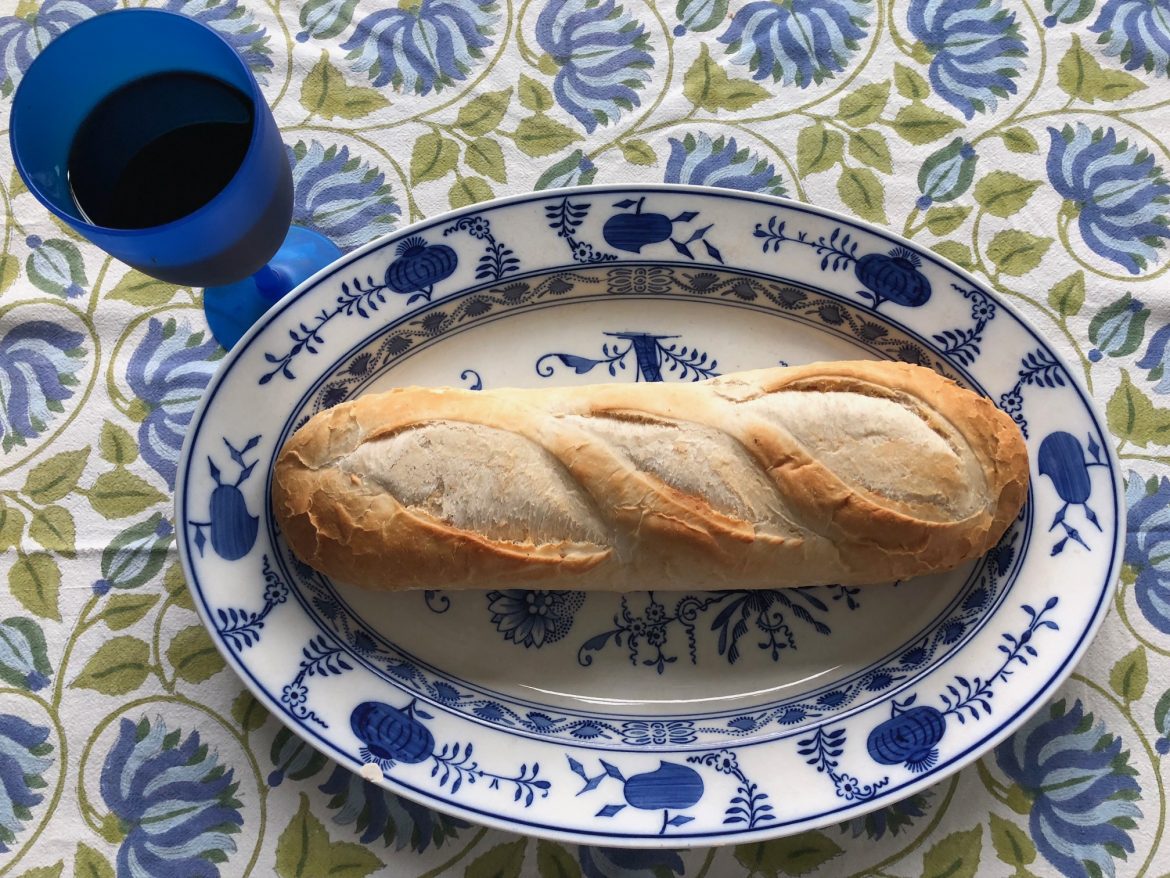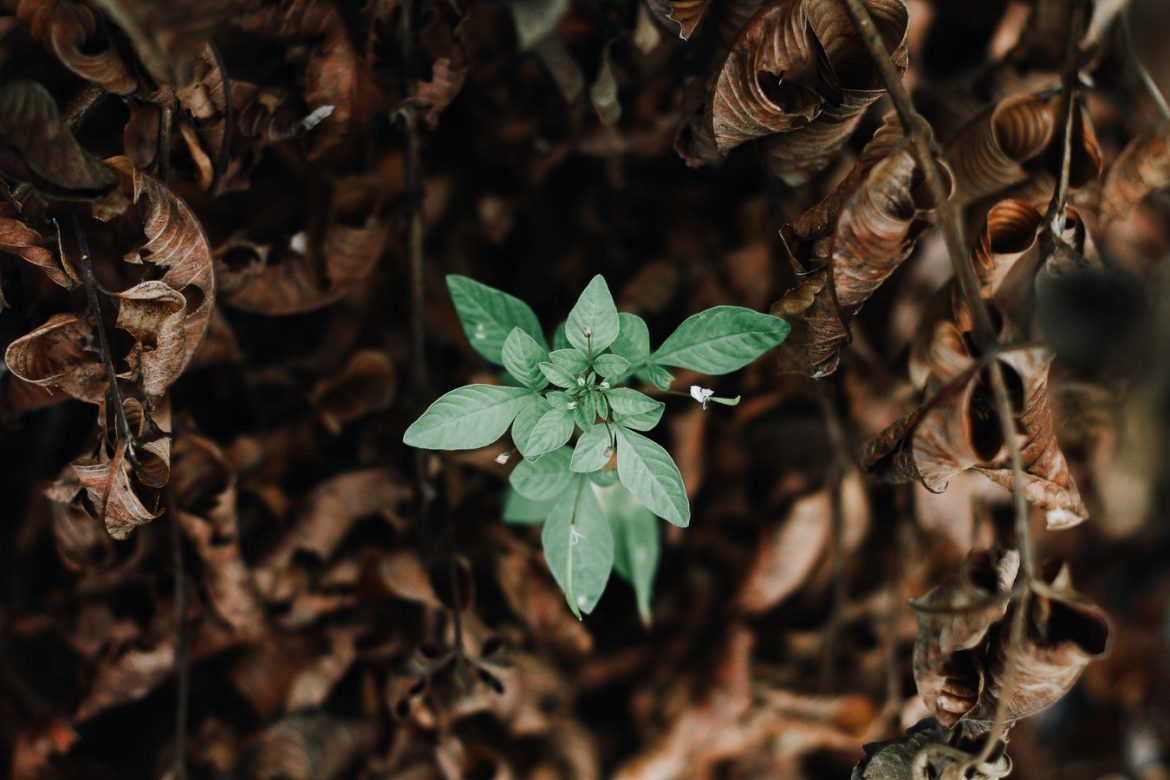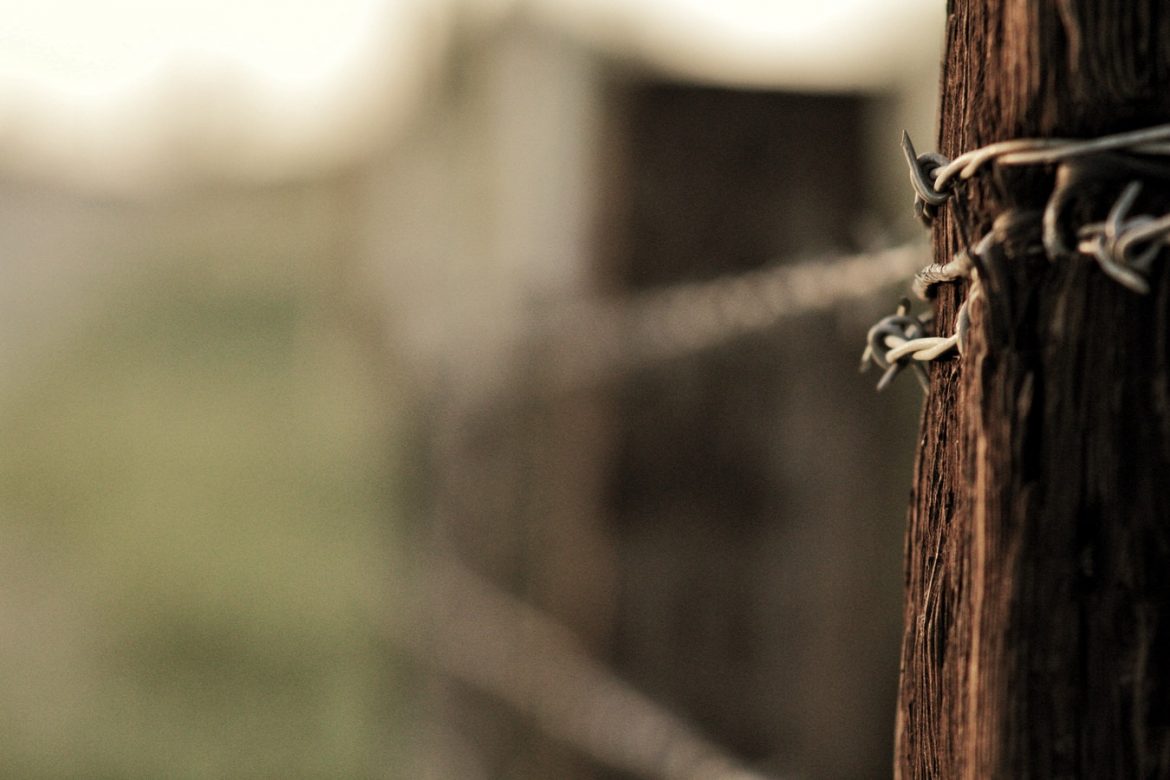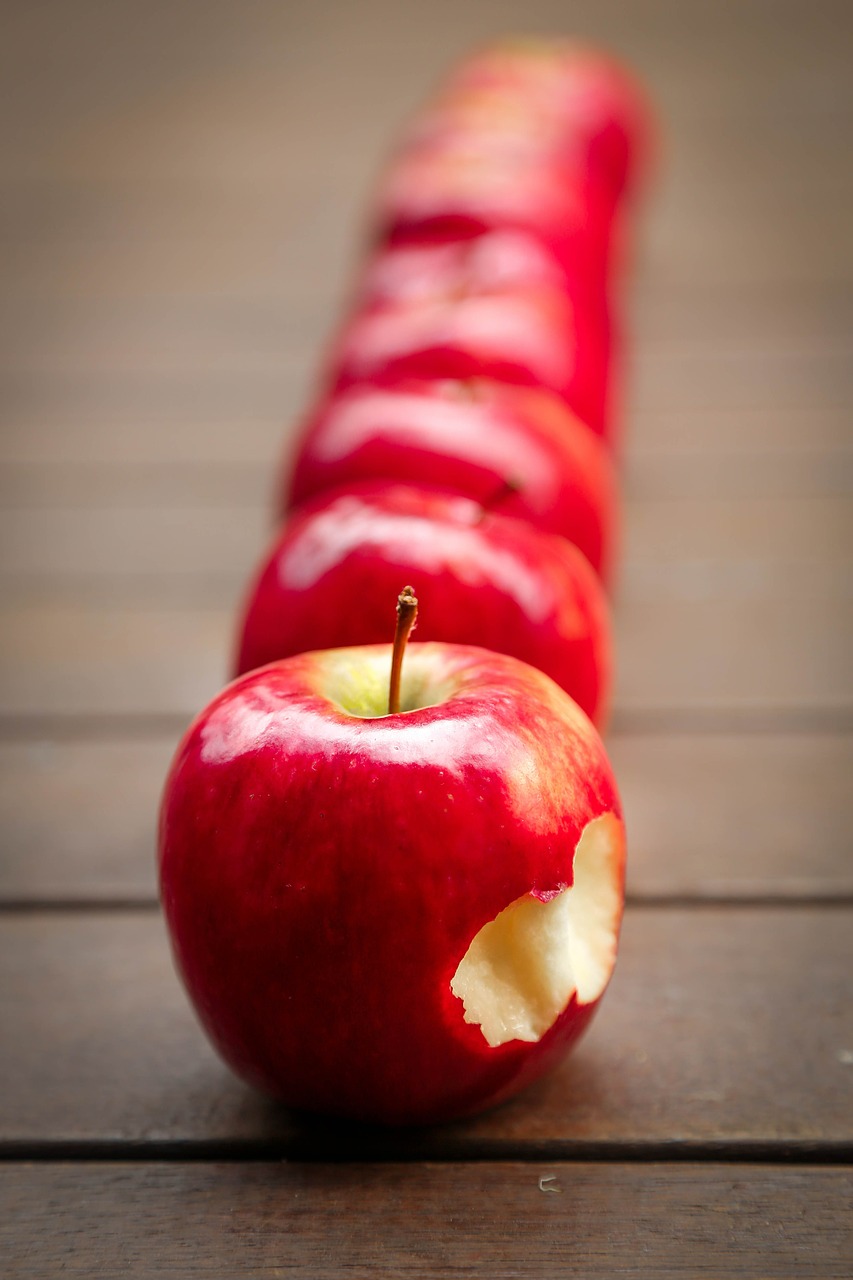By Lilly Lewin
* John 6:35: Then Jesus declared, “I am the bread of life. He who comes to me will never go hungry, and he who believes in me will never be thirsty.
* John 6:48: I am the bread of life.
What are you hungry for today? What do you really need to be satisfied?
More likely a snickers bar than an apple? A pizza verses a salad?
Does it matter?
What would really quench your thirst? …a large bottle of Aquafina, or a double tall latte from Starbucks? 
What do we fill our plates full of? Our literal plates…are they filled with fast food, junk food, fatty foods? Or healthy, organic, fruits and veg?
Our metaphorical plates? Instagram, Nextflix, sport, meetings, paperwork, mountains of laundry and dishes, and activities for the kids, or homework and classes, work, work and more work…
When you think of bread…what comes to mind? For me it’s the smell of fresh baked bread …then it’s the addition of a slab of butter to that fresh piece of bread.
And when you are really hungry at a restaurant…isn’t great when the bread comes to the table before the meal?
Jesus said, “I am the Bread of Life”
Bread is the staple of life in all countries….and rice might be substituted in this verse if you lived in Asia somewhere…”I am the RICE of life.”
Do we allow Jesus to be the first thing on our plates or the last?
Do we fill our plates with so many other things..even good things that we don’t have room for the fresh homemade bread?
Are we starting with the bread or skipping it?
Starting with Jesus? or making Him an afterthought? Or do we think, I can do that someday, after my diet.
What sustains you? What gives you life? Do you settle for less than real bread? Or, Do you settle for an empty plate because that’s all you think or feel you deserve?
God provided manna from heaven, enough for each day. All they had to do was go out & collect it. One day at a time, just enough for that day because any hoarded leftovers would rot. And gather enough for two days before the sabbath, because none would be available on that day because Sabbath day was about rest, not work.
Are you receiving sustenance for today? Or are you worrying too much about tomorrow?
Are you hoarding stuff that’s just going to rot? Are you settling for an empty plate or rotten bread?
Jesus said that he is the Bread of Life. He is the true Manna from Heaven. Are you willing to let Bread sustain you? Are you willing to let Bread satisfy you today? Each day? One day at a time? What would help you trust in Bread? Can you let Bread fill & satisfy you today?
Jesus said, “Take eat …this is my body.”
Do we really believe? Do we really believe that this Bread will sustain us? And what will help us to believe that Jesus will really satisfy us, that this Bread, loving him and living in his love will really satisfy us and help us never to hunger and thirst after other things? Take some time to consider that this week.
Today, Eat a piece of bread and allow Jesus to satisfy you. Savor the taste. Add Jam or Butter. Truly take time to enjoy the flavor, the texture. Talk to Jesus about where you are with him.
Write down on a Paper Plate all the things you are carrying around, all the things on your plate today. Allow Jesus to carry this plate! Allow Jesus to have this plate. Allow Jesus to clean your plate!
And when you see or smell or and when you eat bread this week, be reminded that Jesus is your source of satisfaction. He is truly the Bread of Life.
By Rodney Marsh —
The Lord’s Prayer “Forgive us our sins as we forgive those who sin against us”
When asking for God’s forgiveness, it is wise to remember that God already knows us more thoroughly than we know, or can know, ourselves – the good and the bad, the pleasing and the shameful. Prayer, as Jesus’ teaches us, is more an opening of the heart to love than it is a function of the mind asking or pleading. This is the key to receiving and giving forgiveness.
Receiving a fresh start, a new beginning, having a ‘clean’ slate every day is essential to a fulfilling life. So when we pray, every day, “Father…forgive us”, God offers, every day, fresh heart knowledge (‘I am loved’) and the healing grace to love others to the same degree. Opening ourselves to God’s forgiveness means we receive grace and healing of our own hurts and, as a consequence, enhance our capacity to forgive others. To pray “forgive us” brings interior healing to us and a healing of relationships with others, by exposing us to the grace and love of God.
Children understand this essential simplicity of love and forgiveness. Children naturally and easily open themselves to a new beginning every day. Adults can too, but such openness requires childlike humility.
When we pray “ Father… forgive us” we pray with John Birch:
Bless this day,
this blank page, newly turned.
May its story, once written,
bring only glory to your name.
Amen.
As we continue this months theme, Spirituality of Imperfection, enjoy this beautiful poem by Talitha Fraser —
I poke and prod
prod and poke
inside and out
my blemishes and wounds
scarred recovery and discovery
of what is yet untouched.
The markers of pain are the
milestones of my journey to wholeness
it is in my breaking I am made.
By Lynne M. Baab —
I am having a conversation at coffee hour with a woman who is struggling in her job. As she talks about her discouragement, I say, “Can I say a quick prayer for you?”
She says yes, and right there amid the people chatting over coffee, I put my hand on her shoulder and pray for God’s guidance, strength and mercy for her.
Pastoral care that is uniquely Christian must have a component of prayer. Sometimes we can pray aloud for the person we are caring for as I did at coffee hour that day. Other times, the prayer is silent within us, because we can see that the person we are talking with is feeling very far from God or would not welcome prayer for some other reason.
Pastoral carers can invite care recipients into many different forms of prayer, such as silent prayer, breath prayer, inner healing prayer, using a printed prayer, or praying a psalm together. In order to pray with care recipients, carers obviously need to feel comfortable praying, which can only happen with experience praying on their own or in other settings with people.
Feeling comfortable praying – for the sake of praying with and for care recipients – is one reason by carers need to have a rich life of spiritual practices. I’ll write about three other reasons, and I bet you can think of even more.
- Spiritual practices – various forms of prayer, various forms of Bible study, and other practices such as Sabbath keeping, fasting and journaling – enable us to perceive God’s guidance. Carers need God’s guidance in so many ways. Is God calling me to reach out to this person? In what way? What questions should I ask? What stories from my own life should I tell? Should I offer practical help or simply a listening ear?
I need God’s help to know what to do. Over time, spiritual practices train us in our ability to perceive God’s direction, an essential component of caring.
- Spiritual practices help us rest in the fact that all caring is God’s ministry, not our own. Other people’s lives belong to God, not to us, and we are not responsible for what happens to them or what they experience. We are responsible to care, to walk beside people in their pain, but we cannot fix them, heal them, or change them. This is the single truth that I wish I had known more deeply when I was an associate pastor in a congregation.
In those years, I felt weighed down by people’s pain, as if I was somehow responsible to heal or fix their pain. I wish I had known more clearly that their lives belonged to God, and my responsibility was to journey with them. This perspective can be nurtured by spiritual practices.
- If we have a rich understanding and experience of spiritual practices, we’ll be able to guide care recipients into spiritual practices of their own. One goal of Christian caring is to help people draw near to God. Therefore part of our caring involves helping care recipients figure out the best ways they can do that. If we have had a wide experience of spiritual practices, we will be more likely to be able to help care recipients talk through the ways they already draw near to God. We’ll be able to help them brainstorm new options.
This is the fourth and last post in a series about pastoral care today. I’ve been writing about themes from my new book, Nurturing Hope: Christian Pastoral Care in the Twenty-First Century. The previous posts covered:
I praise God that Jesus is the Good Shepherd who looks out for his sheep. We are called to be under-shepherds, allowing the Holy Spirit to guide us into caring ministry, but God is the shepherd of all the sheep. We can rest in God’s care for us and for those we love.
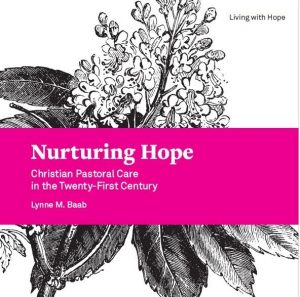
By Rodney Marsh —
The Lord’s Prayer “And do not bring us to the time of trial….”
A crisis seems to be rapidly developing in the Western democracies. At the recent Garma Festival, Richard Flanagan said, “The world is being undone before us. History is once more moving, and it is moving to fragmentation on the basis of concocted differences…….. The bonfire of our vanities is fully loaded with the fuel of growing inequality, fear and division.” I hear the ‘ring of truth’ in his prophecy.
In his day, Jesus often spoke of an imminent, destructive, worldwide crisis or trial. So, when Jesus taught his followers to ask our Father, “Lead us not into trial”, he meant, “don’t, please God don’t push us into the time of crisis before you’ve made us ready for it. Don’t push us until you’ve given us what we need to face it.” (Rowan Williams). Our daily prayer, “…do not bring us to the time of trial” is not therefore, motivated by the desire to avoid inevitable suffering nor is it a desperate plea filled with fear, rather it is a request for courage to face what is coming. It is a prayer made in faith that our Father will see us through whatever is ahead.
When we teach our children to pray, “do not bring us to the time of trial” we are joining with them to travel together through dark valleys and well as the light plains. We face, with confidence, the unforeseen, and often uncontrollable, frightening circumstances of our lives because we know we never travel alone. As the storm clouds were gathering around Jesus, his own daily prayer was “do not bring us to the time of trial”. Consequently Jesus became strong to face what was to come and he told his followers, “When these things begin to take place, stand up and lift up your heads, You will soon be set free.” Perhaps, when a coming firestorm fuelled with “growing inequality, fear and division” can be seen approaching us, and our nation, it is the time to teach our children to pray, “do not bring us to the time of trial” in faith and hope.
Prayer: Our Father, it seems there are storms ahead today. Please let the storm pass, but if it does not, stay with us. In the storm, strengthen us. Grant faith to replace fear. Then enable us to stand up, and lift our heads to welcome our freedom. Amen.
PS We should note that, in context, the word Jesus uses for “the time of trial” does not mean a “temptation”, as in the traditional version of the Lord’s Prayer meaning to be tempted to do something morally wrong. It means rather “crisis” or “trial” such as Jesus experienced in Garden of Gethsemane.
by Christine Sine
Part of the fun of autumn for me is getting fruit and vegetables that will see us through the winter ready to store. I hold apple processing parties and make apple pies, pesto and chocolate zucchini bread that go in the freezer for winter hospitality. I dry apples and tomatoes and sometimes figs. I harvest the dried beans and winter squash and store them away to help provide for our winter diet. What we need is food that will last through the long winter months without spoiling.
What spiritual fruit can we harvest now as a result of our spring planting and summer growth that will see us though the slow and sometimes painful days of winter? What comes to mind for me are:
- Gratitude – for both what has passed and for what is present now in the midst of the shortening days.
- Awe and wonder – appreciating the beauty and wonder of the present season not hankering after what has gone.
- Retreat and slowing down (yes I know I keep harping on this but I need constant reminders and I suspect many of us do.)
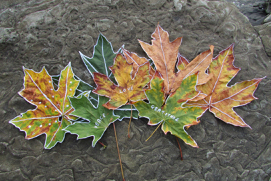 Remember the Past With Thanksgiving.
Remember the Past With Thanksgiving.
What are you grateful for in the season that has passed? One American feast I have embraced with enthusiasm is Thanksgiving. In fact I have made the week of American Thanksgiving my gratitude week. Each morning I love to look back over the year and remind myself of all I have to be grateful for. I am storing up gratitude in my heart and mind to nourish me over the winter.
My favorite scripture to read at this season is Psalm 107 with its repeated refrain: Let them praise the Lord for his great love and for the wonderful things he has done for them. Such good words for us to ponder as we enter a season of change. Then I make a list, if I am on top of my game I write thank you notes and I embellish my journal with decorative thanksgiving patterns. It boosts my spirits and helps me relax into the changes that are coming.
Get Ready To Embrace the New
What are you looking forward to in the new season that is coming? What gives you a sense of awe? I have mentioned before that Tom and I call our daily walks “awe and wonder walks”. We look for what gives us a sense of awe now – the changing colors of autumn and winter, the scenes visible through the bare trees that I cannot see in summer, the changing light that brings breathtaking reflections to the lake. We talk about these and keep our eyes open for them. It brings a certain exhilaration to the season that nourishes our souls and our spirits.
Identifying the benefits we are already aware of in the season that lies ahead is one great way to prepare our hearts and minds for the future. Concentrating on the good that could lie ahead rather than bemoaning what is passing is one good way to keep ourselves in tiptop spiritual condition. Once again it is good to make a list. What are your hopes and expectations for this coming season? What are your goals for spirit, soul and body? What new disciplines will encourage you to embrace the new?
Strengthen Your Stability Zones
It is also good to think about what will not change. What are the stability points in your life that will provide a secure and immovable foundation for what lies ahead? Are there people that support and encourage you? Are there practices that give you a sense of security or that bring light in the midst of the darkness? I find that when I walk each day no matter what the weather is like, the darkness does not bother me as it once did. I have learned to appreciate the cold and enjoy the rain. And I love my nice warm coat and sheepskin boots that make it possible. Are there objects you love or practices you enjoy that anchor you during a season of change? Identifying and strengthen these – store them in your heart and in your soul so that they will nourish you at the right time.
Today is Honey Bee Awareness Day! Enjoy this beautiful post by Jan Blencowe —
This month’s theme, the Spirituality of Imperfect, triggered some discomfort around the prospect of writing about “the imperfect” parts of life, self, and spirituality.
Then there was the curious notion of imperfect actually being spiritual. Perhaps it would be something like the Japanese concept of wabi-sabi, a world view centered on the acceptance of transience and imperfection.
Today is also “honey bee awareness day” and somehow those two things, honey bees and the Spirituality of Imperfect needed to be brought together and produce a pearl of spiritual insight.
There’s a reason we need to have honey bee awareness day. It’s because bees are in trouble. They’re dying from a number of interrelated causes, and we are responsible for the two most destructive factors, pesticides and habitat loss. The way we live on this planet is highly imperfect when it comes to balancing our short term needs (and wants) and making ecologically sound decisions that support both the natural world and humanity’s long term needs, such as sustainable and reliable food sources. Seventy out of the top one hundred human food crops are pollinated by bees. These crops supply about ninety percent of the worlds nutrition. The loss of bees is not only a tragedy but it puts our own survival at risk as well.
A Spirituality of Imperfect brings to mind the triple graces, forgiveness, restoration and unity. These three powerful energies are able to work on behalf of imperfection to create something beautiful. Since my own spirituality will always be imperfect that’s reassuring.
Something imperfect is generally thought of as blemished, marred, tainted, stained, broken, bent, twisted, ruined, or lacking. Imperfect is always what my own spirituality will be in and of itself. However, when grafted into the True Vine, my own spiritual life will have infinitely more love and goodness in it for being permanently united to the Perfect Source.
It’s that union that allows forgiveness and restoration to be graciously and abundantly poured into my soul. I am still imperfect, but now I have access to what is perfect.
These three remedies of forgiveness, restoration and unity inspire me to see my own imperfect spirituality as forgiven, restored and in unity with the Divine. In fact it’s my own imperfect spiritual ways that create the unique need for a spirituality of imperfect and allows for the experience of grace, applied in such a way as to make room for imperfect, to become part of my very imperfect human life.
But what about the bees? Here’s where having a spirituality of imperfect allows for practical, positive, forward movement in my life.
 Eight years ago we bought a beautiful piece of property to build a house on. Someplace to live is a legitimate need, yet the destruction necessary to clear the land, blast the ledge and level a hill was enormous. It’s imperfect to have to cause such destruction to build a home. In this imperfect situation I felt the need to ask forgiveness for the destruction and offer gratitude for the land. That’s what we human beings have been doing for millenia. In fact it is the basis for most religious systems going back into the mists of time. Our ancestors felt compelled to offer gratitude for the animals and plants that provided them with their basic needs, and to ask forgiveness for having to take the lives of animals and plants in order to live. Ceremonies, temples, altars, and rituals around this theme are common in the spiritual lives of our ancestors across the globe. We must eat and we must have clothing and shelter and other living beings must be killed in order to provide that for us. That seems an imperfect way of existing. A spirituality of imperfect requires a spirituality of grace to make it work.
Eight years ago we bought a beautiful piece of property to build a house on. Someplace to live is a legitimate need, yet the destruction necessary to clear the land, blast the ledge and level a hill was enormous. It’s imperfect to have to cause such destruction to build a home. In this imperfect situation I felt the need to ask forgiveness for the destruction and offer gratitude for the land. That’s what we human beings have been doing for millenia. In fact it is the basis for most religious systems going back into the mists of time. Our ancestors felt compelled to offer gratitude for the animals and plants that provided them with their basic needs, and to ask forgiveness for having to take the lives of animals and plants in order to live. Ceremonies, temples, altars, and rituals around this theme are common in the spiritual lives of our ancestors across the globe. We must eat and we must have clothing and shelter and other living beings must be killed in order to provide that for us. That seems an imperfect way of existing. A spirituality of imperfect requires a spirituality of grace to make it work.
After our home was built and I had a chance to assess the property in its state of shock and trauma from the destruction of being cleared, I entered into a sacred contract of restoration and unity with the land. As restoration and unity had been poured into my soul, I would pour restoration and unity into my land.
It was then I made a commitment to replant my land for pollinators, especially bees specifically because of the dangers they face today. Native plants and trees were planted in abundance. Shrubs and perennials as nectar sources were chosen and sited in especially appealing locations for the bees. Of course not only the bees benefited, many other pollinators, butterflies, moths, birds and animals have formed a robust, healthy, unified community on our land. The unity of community includes myself. I feel so much a part of the land and its trees, bees, birds and animals. That sense of unity extends even further into the Divine Life that sustains us all. When I am wandering through my gardens and woods I experience that unity in deep and restorative ways.
The imperfect met by the grace of forgiveness, restoration and unity, and a spirituality of imperfect embraced by a spirituality of grace has the power to move me through the imperfections in life and in my soul to an understanding that sees a greater plan of love and healing at work.
As an Amazon Associate, I receive a small amount for purchases made through appropriate links.
Thank you for supporting Godspace in this way.
When referencing or quoting Godspace Light, please be sure to include the Author (Christine Sine unless otherwise noted), the Title of the article or resource, the Source link where appropriate, and ©Godspacelight.com. Thank you!

